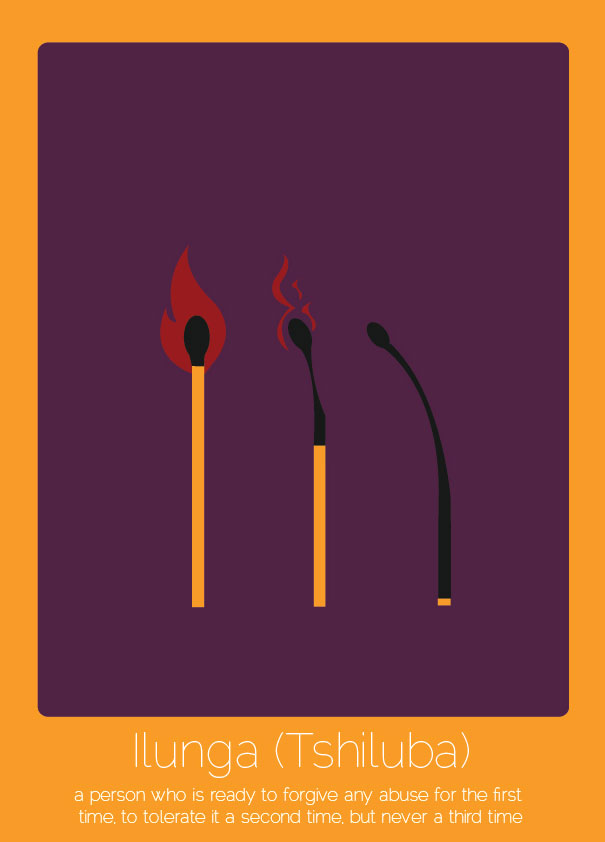
30 Untranslatable Words From Different Languages Illustrated By Anjana Iyer
New Zealand-based media designer Anjana Iyer searched through languages around the world for various interesting words that have no direct translation into English and attempted to capture their meanings with refined and humorous illustrations. The posters from her “Found in Translation” project provide literal explanations of the words’ meanings as well.
The tongue-in-cheek illustration series is part of the “100 Days Project”, a web-based platform that invites various aspiring and acknowledged artists to repeat their chosen creative activity for 100 days, documenting their results on the project’s site. Iyer is almost half-way through, so once you check out what she’s already come up with to explain the untranslatable, make sure to follow her and see what else she creates!
Source: 100daysproject.co.nz | Behance (h/t)
1. Fernweh (German)

2. Komorebi (Japanese)

3. Tingo (Pascuense)

4. Pochemuchka (Russian)

5. Gökotta (Swedish)

6. Bakku-shan (Japanese)

7. Backpfeifengesicht (German)

8. Aware (Japanese)

9. Tsundoku (Japanese)

10. Shlimazl (Yiddish)

11. Rire dans sa barbe (French)

12. Waldeinsamkeit (German)

13. Hanyauku (Rukwangali)

14. Gattara (Italian)

15. Prozvonit (Czech)

16. Iktsuarpok (Inuit)

17. Papakata (Cook Islands Maori)

18. Friolero (Spanish)

19. Schilderwald (German)

20. Utepils (Norwegian)

21. Mamihlapinatapei (Yagan)

22. Culaccino (Italian)

23. Ilunga (Tshiluba)

24. Kyoikumama (Japanese)

25. Age-otori (Japanese)

26. Chai-Pani (Hindi)

27. Won (Korean)

28. Tokka (Finnish)

29. Schadenfreude (German)

30. Wabi-Sabi (Japanese)

















Got wisdom to pour?
Terribly bad illustrations.
Great idea and great illustrations. However, as a German I’d like to point out that concerning the ‘Fernweh’ it doesn’t really matter if you’ve been to that place before or not but it’s the opposite (the acronym if you wish) of ‘homesick’. When you are ‘sick to leave for an afar place’ – which is the literal translation of Fernweh, you are at home but desperately looking for a chance to beam yourself to a place far, far away from your daily routine, some people, sonetimes maybe even your house feels like a prison. Having Fernweh means you want to escape from what annoys you most. The place you imagine yourself to be, hence, can be any place you consider to be less stressful or routine: it could be sunny, or snowy, or whatever you understand to be the ideal opposite of your current situation. However, I assume that in 98% of all cases the Fernweh-phase either lasts about a year (for young people until they had their year abroad) or two to three weeks (for the others) to recognize that ‘theres’s no place like home’.
Really good idea and illustrations! I’d only like to add that all of these words don’t have any translations in French, except for Chai-Pani, which is “pot-de-vin”.
Chai Pani has translations in MANY languages… where corruption is rife!
that’s for sure. in Ukrainian ther’s a word khabar that practically means the same
that’s right. And in English it is called a bribe. How is it untranslatable?
How could I get one of these made for “Ausschlafen” in German, meaning ” to wake naturally feeling rested and refreshed.” ??
I have definitely experienced “Mamihlapinatapei” :-)
‘Gezellig’ is one in dutch.. And dutch also has a word for Schadenfreude…
Gezellig can be translated. In Danish for example, they use the word hyggelig(t) in the same way the Dutch use ‘gezellig’. I found out both the Danes and the Dutch think their word is unique, but it isn’t!
prozvonit = prank call…
nope! the point is that you arranged with a friend that for example you will ring them when you get to the place of meeting or when you are near, so they can also leave their house. the point is that they don’t answer because you don’t have much money on your mobile account or just don’t want to spend them
Australian English is in need of many new words. Too many things are difficult to easily explain.
good idea, bad execution (bad illustrations + typography).